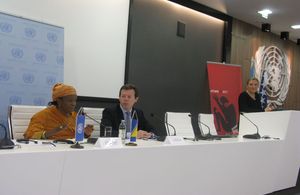Legacy of wartime sexual violence in Bosnia still far from addressed
Why Bosnia remains a priority in global efforts to tackle the issue of sexual violence in conflict, and why the UK has made this one of its top foreign policy priorities

Ambassador Nigel Casey and UN Special Representative Zainab Bangura at the press conference in Sarajevo, 14 June 2013.
Last week Zainab Bangura, the UN Secretary General’s Special Representative for Sexual Violence in Conflict, made a welcome visit to Bosnia and Herzegovina (BiH). She spent a week travelling the country, speaking to victims of sexual violence from the war here in the 1990s, understanding the context, and pressing politicians to give more attention to the terrible legacy of crimes committed in that period. She will be reporting on her visit to a special session of the UN Security Council convened by the UK on 24 June, and chaired personally by our Foreign Minister William Hague.
Why did Mrs Bangura take time to visit BiH, and why should it be a priority for her work and ours on this issue, when BiH is at peace, and sexual violence is taking place every day in armed conflicts elsewhere in the world? The answer is that, nearly two decades on, BiH has made shockingly little progress in facing up to the legacy of the estimated tens of thousands of such crimes committed here during the 1992-95 war.
The OSCE calculates that only around 60 cases of sexual violence from the war in BiH in the 1990s have so far been prosecuted to date in the whole country. The vast majority of these crimes remain unpunished, and many have not even been acknowledged. The BiH justice system has proved inadequate to dealing with war crimes as a whole. But it has failed in particular when it comes to crimes of sexual violence. As Mrs Bangura found when she visited, these are in effect treated as second class crimes, their victims as lower priorities for the justice system.
This is not only a totally unacceptable situation for the thousands of victims. It is also holding back a whole society, since genuine reconciliation has proved impossible to begin in earnest while such a terrible burden hangs around its neck.
The failure to make more progress is a direct result of the refusal of leaders on all sides to acknowledge the suffering of victims from other communities, and the deliberate political interference which has left the justice system financially and politically hobbled and unable to do its job objectively and without political pressures.
There are three things that we know need to be done in BiH.
First, more support for survivors. Victims brave enough to pursue justice need practical support guiding them through the complex and opaque legal system. Many victims still suffer untreated trauma and need psychosocial support. And much stronger witness protection measures are needed especially in lower level courts, now that many cases have been devolved below state level. The relevant local and international actors will need to work together closely to effectively help BiH address these needs.
Second, more official recognition for victims. The BiH Government should approve the draft ‘Programme for Victims of Wartime Rape, Sexual Abuse and Torture and Their Families in BiH’, to help give victims a future. Political leaders should be brave enough to acknowledge the suffering of people from communities other than their own, and they should stop misusing Victims’ Associations for political purposes.
Third, uniformity of treatment of victims in different jurisdictions in BiH.
The international community has a big role to play in supporting BiH authorities and helping make all this happen, as it does in tackling this issue across the world. Mrs Bangura rightly stressed the importance of strategic, coherent leadership in bringing the efforts of all international organisations and committed states in a more effective way. It’s because we recognise this need that our own Foreign Minister, William Hague, has dedicated a great deal of time, energy and diplomatic resource to this issue over the last year.
A year ago he launched a UK initiative to try to galvanise more effective global efforts to stop sexual violence where it is still happening in armed conflicts today, to end impunity for the perpetrators, and to provide proper support to the victims. The London launch was accompanied by a special screening of Angelina Jolie’s ’In the Land of Blood and Honey’ – a reminder of the horrifying scale of sexual violence that occurred in a developed European country less than 20 years ago.
A year on, the results of this new energy and attention are already significant. In April G8 Foreign Ministers adopted an historic declaration making clear that sexual violence was a breach of the Geneva Conventions. This is critical to moving firmly away from the long-held idea that sexual violence was ‘just something that happens’ during wartime. G8 states also pledged $23 million to put behind international efforts to tackle the problem today. The 24 June UN Security Council Special Session will be a reminder that the issue remains far from properly and honestly addressed in Bosnia too, and that both local and international actors must redouble their efforts to put it at the top of their political and practical agenda.